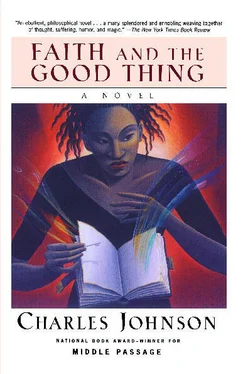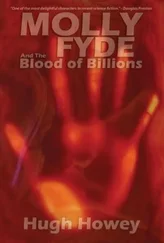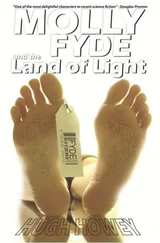Fog had descended on the city like a curse, a gray-green gloom that stuck to the sides of the car. Fog filled up the spaces between trees and bushes on the boulevard; fog bloated the alleys and lay in great formless clouds that blotted out the sky and street; fog hung above the road like an alien intelligence. Down the street a car emerged with glaring headlights from the gloom, blinding Faith, who gripped the wheel tighter and slowed down until she and Maxwell coasted into a small pocket of clarity much like the clear spaces in a dream.
“Are you all right?”—Faith.
Maxwell was staring at his bloody right knuckles. “Did you see what I did to his eye?”
Faith said, “Yes,” and turned her attention to her own problem. Not only were her stockings wet, but her shoes were now slowly filling up, too. She started to cry.
“I’m sorry, honey,” Maxwell said as he came to himself again. “The evening’s ruined. If there’s anything I can do to make this up to you—”
After parking in front of his apartment, Faith slid across the seat and rested her head on Maxwell’s overly padded shoulder. She slid her hand into his open sports coat, and let it rest, rising, falling. Falling on his chest.
“I’m so glad you were there, Isaac.” That didn’t sound soft enough. She adjusted her tone. “That man, whoever he was — he frightened me.”
“That sonuvabitch!”
Maxwell lifted her chin with his right forefinger. He stared blankly for a long while into her eyes, and Faith was thankful that nothing in them could be seen, inferred, or guessed about her feelings. He opened the driver’s door and helped her out, then guided her along the sidewalk and into his apartment building. Once inside, he left the living-room lights out and, directed only by the small bulb over his kitchen bar, fixed them drinks, calling to her in a quavering voice, “He acted like he knew you! Can you imagine ? The lines these characters come up with. The nerve! I wish I’d had a gun—”
Her wet clothes were unbearable. In the darkness of the front room, she slipped off her shoes, stockings, and the rest. They were a ruin. She dropped them behind the sofa and sat down. Maxwell returned to the front room and stopped a few feet in front of her, a glass in each hand, his shoulders trembling as he looked her over. His breathing was louder than the whir of the air conditioner, the humming of the electric clock in the kitchen. Slowly he sat down, handed her a drink, and began pumping his respirator between his lips. “It’s a g-good thing I was around. ”
Now.
“Isaac, I really do need you. That’s clear now.”
“What?” Click, click —whir.
“I simply can’t. make it by myself.” As she said it, her right fist closed, as if squeezing some object, then opened, as if she were releasing dust. “I need someone who can control a situation — like you do.”
“You do ? Faith!” He grabbed at his throat, and she thought he was about to faint. “No,” he said in a strangled voice, “it’s not that. I never dreamed. You do care, don’t you?”
Click.
“It’s true,” Faith said. She looked away, out the picture window behind them to the shadowy suggestion of trees beyond, to a squirrel peering at them from one of the lower limbs. She remembered having a squirrel once, and that it was so friendly she could feed it peanuts, bread crumbs, and candy right out of her hand. In the mornings it would follow her into the farmhouse kitchen, then eat with her at the table like an honored guest. By and by it came to think everyone was as kind as Faith, and wandered up to Eula May Jenkins one morning to beg for food. Eula May shot him dead — she was skinning him, pulling the pelt off his bones when Faith walked into Eula May’s kitchen to borrow flour for Lavidia. Thereafter, Faith never befriended squirrels again, nor had she given her affections easily, for fear that her loved ones would be snatched away from her by circumstances or, worse, by death. Somehow her affair with Maxwell was different: he could be replaced easily, as an object you loved could not; he could be Isaac Maxwell, Tom Maxwell, Dick Maxwell, or Harry Maxwell — and she wouldn’t give a tinker’s damn.
She could see Barrett’s features in the window, frowning. Poor old foolosopher, she thought. Then she turned to Maxwell and said, “I’ve never cared about anybody but you.” When he said nothing, she turned to him, her stomach knotting as severely as when she had the curse. Suspended like shimmering icicles on Maxwell’s cheeks were tears. He was sniffling and rubbing his nose. Faith looked away; it was going to be harder than she’d thought.
He said, at length, “I can aw-aw-always be with you!”
Her head swam, and she really felt sick now. Thought, What am I doing to him ? Then, What am I doing to me ? To avoid looking directly at him she placed her arms around his neck, clasping her hands together between his shoulder blades, and buried her face in his chest.
“Yes,” she whispered, “I do need you, Isaac.”
“Faith, I’m nuh-nuh-NOTHING! I’m nuh-nuh-NOBODY, but I–I swear I’ll work for y-you. I luh-luh-love you!” And he heaved a long sigh.
Good, she thought, very good. And she closed her eyes and clenched her fists. Her ear to his chest, she could hear his heart, a loud, throbbing, roiling thing in his breast: Tha- bump, whir-rrr . and the words were on her lips, had been there since the day she’d met him, and now, as he fought for breath and squeezed her tight enough to cause her pain, she could say automatically, quickly and without a thought:
“Be my good thing. ”
“Y-Yes!” shot from Maxwell’s lips. His arms went slack with exhaustion. “Wuh-Wuh-Will you marry me?”
She opened her eyes, casting her gaze upward through the darkness to the round figure of a faded rosette in the center of the ceiling, then to the picture window where Barrett’s disembodied hazel eyes closed in something like defeat. A shiver of triumph swept over her. The contest of wills. She shut her eyes again, relaxed.
“Yes.”
Faith Cross was among the dead living. We hear all the time of the living dead, those restless, glassy-eyed ghouls whispered of in a trembling voice by our white-haired elders— dead, because their bodies move only at the bidding of witchmen working black magic along the bayou, or in the swamps where, in the stench of black soil teeming with floral decay, their zombies wait, tight-lipped and reeking with age, calling for release— living, because their souls, freed like jinn from ancient fire-forged urns, drift between our troubled realm and the netherworld. They wander through our world as elusive as smoke, peering through our windows while we sleep, gibbering. Snickering. They have no names now, so we call them ITs. Yet the elders don’t tell the entire tale. Seldom is it pleasant. There are, as well, the dead living — their bodies grow, move, but their souls, alas! are as still as stone.
Now, Faith Cross was such a one.
Objects have no name. They are ITs, and this is what Faith saw reflected in her bedroom mirror on the day of her first wedding anniversary. IT was portly, IT stared with puffy eyes at her from the smooth glass, IT’s body was well fed, but was losing IT’s health; IT was lugubrious with a gleam along IT’s round limbs, as swollen as a corpse in its seventh day. To tell the truth, Maxwell would have to hug her on the installment plan. Faith, dissatisfied and filled with disgust, turned from the mirror to glare at Maxwell, who had inspired her self-inspection with a smug remark about her widening derrière.
Читать дальше












